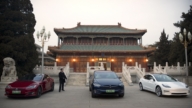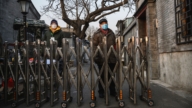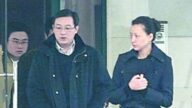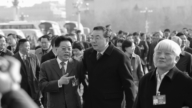【新唐人2013年11月26日讯】在中共三中全会通过的《决定》中,提出了一个“探索实行官邸制”的设想,宣称这是一种可以“从根本上遏制官员以权谋房的新措施”。评论则指出,中共官员的财产都不敢公开,提这个不痛不痒的“官邸制”,没有实质性意义。公众最关注的是﹕实施公开官员财产的“阳光法案”。
刚刚闭幕的中共第十八届三中全会,审议通过了两万多字的《中共中央关于全面深化改革若干重大问题的决定》,其中提出一系列所谓的改革措施,却回避了民间呼声最高、最具代表意义的“官员财产改革措施”。
在所谓深化改革的《决定》文中提到,规范并严格执行领导干部工作生活保障制度,不准多处占用住房和办公用房,不准超标准配备办公用房和生活用房,不准违规配备公车,不准违规配备秘书,不准超规格警卫,不准超标准进行公务接待,严肃查处违反规定超标准享受待遇等问题。探索实行官邸制。
“中国特色官邸制研究”课题组负责人汪玉凯,11月16号对媒体说,中共领导干部到某地任职,地方大都为他们准备好“住所”,这个住所往往就成了他个人资产,还可留给后代。实行“官邸制”是遏制领导干部“以权谋房”的途径。
大陆维权律师唐荆陵表示,公众最关注的公开官员财产的“阳光法案”,提了几十年却不实施,提这个不痛不痒的“官邸制”,没有实质性意义。
大陆维权律师唐荆陵:“‘官邸制’指的是高阶的官员整个任职期间都要住在‘官邸’里,这个要配套信息公开,配套新闻自由才有意义,不然的话,做这些东西没什么意义,只不过再浪费一笔钱,给官僚们做一个大房子。”
汪玉凯曾经提出,“官邸制”是一种官员的住房制度,目前有许多国家采用。他说,在国外,一定级别官员的官邸和私邸是严格区别的。私邸是官员跟老百姓一样,在市场上购买的私人财产,官邸只能在任职期间居住,个人没有产权。
时政评论员汪北稷:“这确实是一个民主国家行政官员地方性的一种制度,但是大多数除了地方主要州长、市长、总统之外,绝大多数西方民主国家的官员都是自己解决住房,像日本,还有很清贫的首相,自己的房子都没有,只能租。”
而中国特色官邸制研究人员把实行“官邸制”的范围,规划在四类人群之内,其中包括数量相当可观的中央及地方高官。
据大陆媒体统计,自2000年以来,半数落马的省部级高官,涉及的房地产数量从几十套到上百套。仅原铁道部部长刘志军贪腐案中,刘志军涉及374套房产。
大陆《权利运动》组织发起人胡军认为,这种与国际接轨的说法,就是变着法子给中共官员们增加更大贪污的机会,也是规避官员财产公开的捷径。
胡军:“我们知道很多地方,它一谈就是要与国际上接轨,可是你真正要它接轨的时候,民主、宪政要接轨的时候,它就不干了,不能学西方的。它们所要学的东西基本上为它们的专权和更多的贪婪,更多去榨取民脂民膏找借口。”
时政评论员汪北稷也认为,缺乏西方民主监督的政治体制,中共官员可以利用权力将财产转移。
汪北稷:“在缺乏了权力来源的合法性、政治权力结构的合理性、和第三方监督的自由性,在几个基础之下,中共学习西方官邸制没有用,那么官员可以把他的财产挂到他朋友的名下,虚立人头,可以把财产转移到海外去。”
汪北稷指出,中共的核心问题是权力来源的问题,不解决这个问题,提什么改革都是空谈。
采访编辑/李韵 后制/李勇
Avoideding the core issue by exploring the CCP’s official residence system
In the resolution of the Third Plenary Session of the 18th CCP
national congress,
the idea of “exploring the implementation of the
residence system" was proposed.
It was claimed that this is a new way to curb the officials
housing corruption radically.
There are comments pointing out that the CCP officials
dare not to open property information.
This superficial “official residence system" has no
substantive significance.
The public main concern over the implementation “Sunshine Act",
is that the officials’ property should be open
to the publics view & opinion.
The Third Plenary Session of the 18th CCP national congress,
approved “The CCP Central Committee resolution on major
issues of deepening the overall reform".
One of the reform measures avoided, was the “officials
property reform measures",
which was required the most by the public.
In the so called “deepening reform resolution", it was
mentioned that the leaders’s living security
system should be normalized.
The occupancy of multiple housing and office spaces,
the violation of official cars, secretaries and security guards,
& the excessive official reception are not allowed.
Any excessive indulgences will be severely punished. The official
residence system will thus be explored.
Wang Yukai, the leader of the “Chinese special residence
systems research group" said to the media on Nov. 16th that,
if the CCP leaders serve in a local government, their house
will be prepared by most of the local governments.
This residence often becomes his/her own personal asset
and can be passed down to future generations.
The implementation of “the residence system" is a way of
curbing officials housing corruption.
Tang Jingling, a human rights lawyer in China said, the public
are concerned over this “Sunshine Act" the most,
which requires the officials to open up their property information.
The “Sunshine Act" was mentioned more than 10 year ago, but
there was no implementation, until now.
There is no real meaning for this superficial
“official residence" system.
Tang Jingling: “Residence system’refers to the principle,
that high-level officials should be living in the
residence during the entire tenure.
The related information should be open with the freedom of news.
Otherwise, there will be no meaning for these measures.
It could just be wasting money to make a big
house for the bureaucracy."
Wang Yukai pointed out that as a housing system for officials,
the “residence system" is adopted by many countries.
He said that in foreign countries, officials with certain positions
could have both official residence and private houses,
yet there are differences between them.
The private housing of officials is the same as the public’s.
The official residence could be lived in during the
entire term of tenure without property rights.
Commentator Wang Beiji: “It is really a local administration
system for officials in democracy.
In most cases, the officials should find a house by themselves,
except for the President, Governor and several Mayors.
For example, the Prime Minister in Japan is poor, he does not
have his own house, he has to rent his house."
However, “Chinese special residence systems research group"
plans to put four groups of people into the “residence system",
including many high level officials in the central
and local governments.
According to mainland media statistics reports,
since year 2000, half of all the sacked provincial
& ministerial level officials pocess from ten up
to 100 sets of real estates.
In the corruption case of Liu Zhijun, former Minister of Railways,
374 sets of real estates were found to be owned by him.
Hu Jun, promoter of the “rights movement" organization
in China believes,
the solution with so-called international standards
will change nothing,
but to increase the chances of greater corruption
for CCP officials.
It is also a shortcut to avoid the open property requirement
of the public.
Hu Jun:"We know that in many places, they always mention
connecting with the international standards.
But when we really want connection with democracy &
constitution, they will quit with an excuse:
‘do not learn from the West.’ What they basically want,
is to learn new ways to help them strengthen
their authoritarian rule, have more gains & still more greed.
They would like to gain more excuses to squeeze the public."
Commentator Wang Beiji also thought that Chinese officials
can use their power to transfer property due to the
lack of democratic oversight in the Western political system.
Wang Beiji: “In the absence of rationality of power
source and structures, third-party oversights & freedom
of legality, without these basic underlying principles in place,
the CCP will learn nothing from the Western residence system.
The officials can link their property to a friend’s name.
They could even transfer the property abroad."
Wang Beiji pointed out that the key issue
of CCP is the power source.
Without solving this problem, any reform will be useless.
Interview & Edit/LiYun Post-Production/LiYong



























